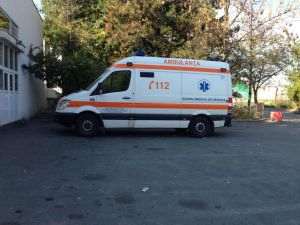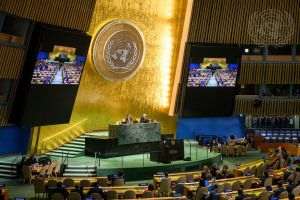Secretarul de stat american Antony Blinken a denunţat miercuri atacurile "barbare" ale Rusiei asupra infrastructurii civile din Ucraina, la finalul reuniunii de două zile a miniştrilor de externe din cadrul NATO de la Bucureşti, relatează Reuters, potrivit Agerpres.
"În ultimele săptămâni, Rusia a bombardat peste o treime din sistemul energetic al Ucrainei, lăsând milioane de persoane în frig şi în întuneric", a spus el într-o conferinţă de presă.
"Acestea sunt noile ţinte ale preşedintelui (rus Vladimir) Putin. Le atacă puternic. Această brutalizare a poporului ucrainean este barbară", a declarat secretarul de stat al SUA.
Strategia lui Putin "nu a funcţionat şi nu va funcţiona", a dat asigurări Blinken.
De asemenea, el s-a declarat încrezător că Finlanda şi Suedia se vor alătura în curând Alianţei Nord-Atlantice.
În acelaşi timp, el a precizat că aliaţii NATO sunt îngrijoraţi de dezvoltarea militară a Chinei şi de colaborarea acesteia cu Rusia.
Printre politicile Chinei care îngrijorează NATO se numără "folosirea dezinformării, dezvoltarea sa militară rapidă şi opacă, inclusiv cooperarea cu Rusia", a explicat Blinken.
"Dar rămânem angajaţi în a menţine cu dialog constructiv cu China acolo unde este posibil şi salutăm oportunităţile de a colabora în privinţa provocărilor comune", a adăugat el.

























































1. fără titlu
(mesaj trimis de anonim în data de 30.11.2022, 17:54)
In Irak erau atacuri democratice
1.1. fără titlu (răspuns la opinia nr. 1)
(mesaj trimis de anonim în data de 01.12.2022, 05:46)
Orice tampenie rusii pot sa o faca de 10 ori mai mare decat oricine
2. Titlu
(mesaj trimis de Protaru în data de 30.11.2022, 18:40)
Yankeilor, voi sunteti barbari.
2.1. fără titlu (răspuns la opinia nr. 2)
(mesaj trimis de anonim în data de 01.12.2022, 05:47)
e concurs de barbarisme si e randul rusilor la serva?
2.2. Titlu (răspuns la opinia nr. 2.1)
(mesaj trimis de Protaru în data de 01.12.2022, 09:49)
E concurs de interese, doar ca americanii se pretind civilizati in timo ce si le satisfac la fel de barbar ca orice alta putere.
2.3. Titlu (răspuns la opinia nr. 2.2)
(mesaj trimis de Protaru în data de 01.12.2022, 09:50)
in timp*
2.4. fără titlu (răspuns la opinia nr. 2.2)
(mesaj trimis de anonim în data de 01.12.2022, 10:00)
si rusii nu se prefac civilizati? cica nu s-au atins deloc de civili, de fapt nici nu aveau cum ca doar nu au atacat ucraina, nu?
Desi ai citit istoria dupa sovietici vezi ca dupa barbarii de americani au aparut si state prospere, dupa barbarii de rusi ramane, fara exceptie, doar saracie si dictaturi
3. fără titlu
(mesaj trimis de anonim în data de 30.11.2022, 20:17)
In Belgrad americanii bombardau infrastructura
de curent si apa fara a fii barbari
3.1. fără titlu (răspuns la opinia nr. 3)
(mesaj trimis de anonim în data de 01.12.2022, 08:50)
Excelent comentariu. Sa revedem crimele barbare ale NATO comise in mai 1999 asupra Serbiei, distrugand 80% din capacitatea energetica de transport energetic, lasand fara curent si apa milioane de sarbi.
Washington Post, may 25, 1999.
BELGRADE, May 24 – NATO airstrikes on Yugoslavia's power grid left millions of people without electricity or water service today, bringing the war over Kosovo more directly into the lives of civilians across the country.
Three consecutive nights of air attacks caused extensive blackouts in Belgrade, Novi Sad, and Nis, the three largest cities in Serbia, Yugoslavia's dominant republic. In contrast with previous attacks on the power supply – in which allied warplanes triggered temporary outages by dropping carbon-fiber filaments that shorted out electrical lines – NATO forces this time struck at Serbia's five major power-transmission stations with high-explosive munitions, causing damage that could take weeks to repair.
Officials at the Pentagon and at NATO headquarters in Belgium said allied jets deliberately attacked the power grid, aiming to shut it down more completely and for longer periods than at any time previously in the two-month-old air campaign. U.S. officials estimated the attacks had shut off power to about 80 percent of Serbia.
Allied officials said the attacks were intended to disrupt operations by the Serb-led Yugoslav military in Kosovo, the focus of the conflict, and not target civilians. But by increasing the hardship of ordinary citizens, alliance leaders also appeared to be seeking to encourage public disaffection with the government of Yugoslav President Slobodan Milosevic.
The attacks also slashed water reserves by damaging pumps and cutting electricity to the few pumps that were still operative. Belgrade's water utility said that reserves of drinking water had been reduced to 8 percent, according to the Beta news agency, and that 60 percent of the city was without water service. The agency said authorities were trying to restore water to most city residents by midnight.
A NATO spokesman, Peter Daniel, insisted that allied warplanes were not targeting the Yugoslav water system or main power plants. Instead, he said, the attacks were aimed at "the transformers and the edges, so to speak, of the electricity-generating system."
Still, military officials confirmed that the objective of using conventional explosives against parts of the power grid was to cause longer-lasting disruptions of electrical service. "It's fair to say we made the decision that we're going to attack some elements of it in a way that's going to take it down for longer than it would have been," said a senior officer at the Pentagon.
By focusing the attacks more on distribution lines than on main production components, the officer said, the damage should take weeks, not years to repair. He said Yugoslav authorities have access to "auxiliary power supplies for many of these facilities," but he added that the latest attacks should prove more challenging for the Yugoslav military than the brief outages caused by the filament drops.
That weapon is a highly classified munition that throws out clusters of bomblets packed with chemically treated strands that act like lightning when they touch an electrical structure, causing widespread outages but no permanent damage.
3.2. fără titlu (răspuns la opinia nr. 3.1)
(mesaj trimis de anonim în data de 01.12.2022, 10:02)
may 25?